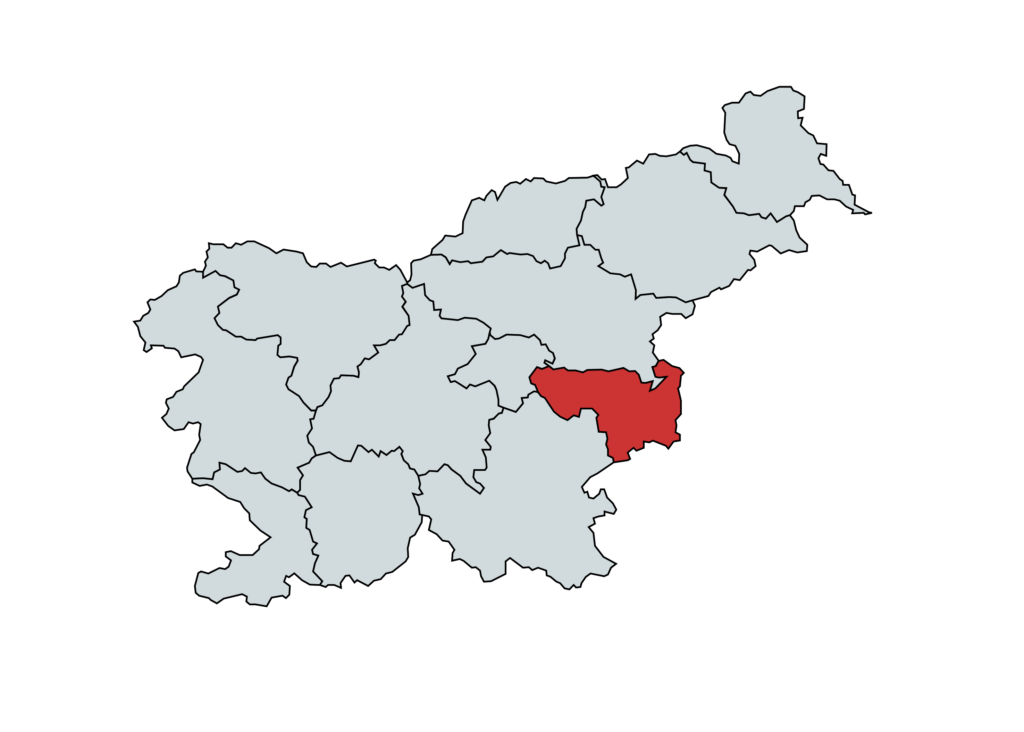The Posavje Statistical Region, located in southeastern Slovenia, spans 885 km² and comprises 4.4% of the nation’s territory, making it Slovenia’s second smallest region. Positioned along the lower Sava River and bordering Croatia, Posavje is largely rural and is known for its diverse natural landscapes, including both hilly areas and flat river valleys. The region’s sustainable development vision, “Posavje 2030,” aims to maintain Posavje as a green, healthy, and safe area. In line with this, local institutions actively preserve natural sites such as Kozjanski Park and the region’s cultural heritage through organizations like the Posavje Museum in Brežice and the Božidar Jakac Art Museum.

Posavje has a population of 75,807 (2019), making up 3.6% of Slovenia’s population, with a density of 78.3 people per km² across 409 settlements. Approximately one-third of the population resides in urban areas, with the majority in rural communities across municipalities such as Krško, Brežice, and Sevnica. The region faces a demographic challenge as the population is slightly declining, and aging is above the national average in most municipalities except Kostanjevica na Krki and Krško. Though employment within Posavje has grown, many residents work outside the region. Local employers encounter workforce shortages, particularly in technical fields, tourism, and healthcare.
Posavje’s economy is underpinned by entrepreneurial activity and established industries, including energy, tourism, and agriculture. The region’s future economic focus is on expanding the energy sector and modernizing metal manufacturing and machinery industries, with growth projected in logistics, business services, and tourism. Regional economic institutions, including the Chamber of Commerce and local agricultural bodies, support this development through partnerships across sectors. Although the unemployment rate is declining, long-term and older unemployed individuals present a challenge due to limited educational opportunities. The number of organic farms is slowly increasing in the region, with family farms forming the backbone of Posavje’s agricultural sector, though growth in organic production remains modest despite government support.

The National Institute of Chemistry, as of December 31, 2021, has 374 employees, with about 331 engaged in research across 9 departments and two infrastructure centers. Among them, 163 hold doctorates of science degrees. Research covers materials, life sciences, biotechnology, chemical engineering, analytical chemistry, and environmental protection, aligned with EU Horizon 2020 priorities. The institute trains 74 graduate students within the national Young Researchers Program and collaborates closely with industry, constituting 20% of its income. It provides high-level research equipment, including cutting-edge tools like a Karl Zeiss Supra 35 VP Electronic Microscope, high-resolution powder x-ray diffractometer, and an 800 MHz NMR spectrometer – the first of its kind in the new EU member states. The institute achieved ISO 9001 standards in December 2003, making it the first research institution in Slovenia to do so.

Regional Development Agency Posavje, situated in the Lower Sava region, Slovenia, plays a vital role as a coordinator of regional interests between local and national levels. Acting as a bridge between ministries, government organizations, municipalities, companies, and other institutions, it promotes and implements harmonized regional development. The agency manages various development tasks, including regional financial schemes, company scholarship programs, and local action groups co-funded by European funds, contributing to the overall progress of the region. Additionally, it serves as the lead partner for the Local Action Group Posavje, overseeing numerous projects funded by EAFRD, EMFF, and ERDF in different periods, showcasing its commitment to regional development.



This project has received funding from the European Union’s Horizon Europe research and innovation program under grant agreement no 101060876. UK participants in Horizon Europe Project RURALITIES are supported by UKRI grant numbers: 10051963 The Highlands and Islands Transport Partnership and 10050988 Earthwatch Europe.
